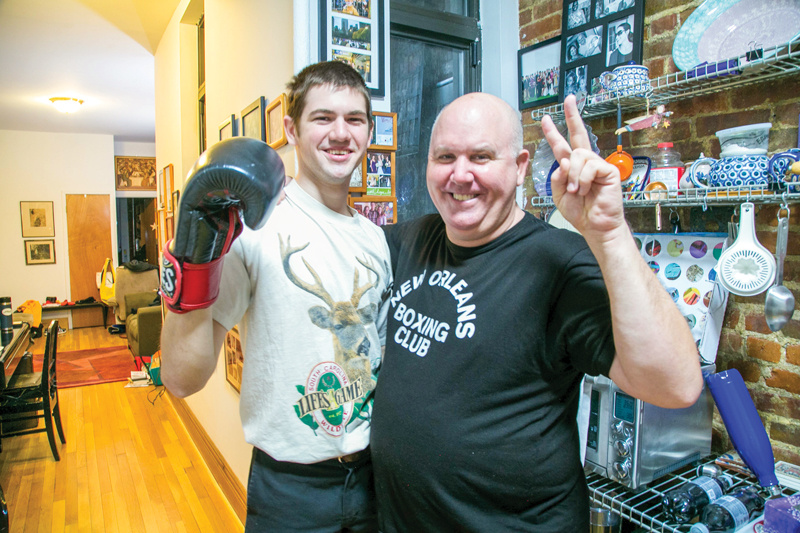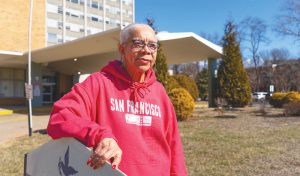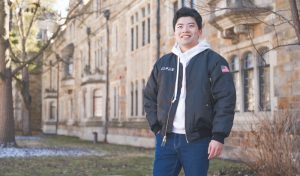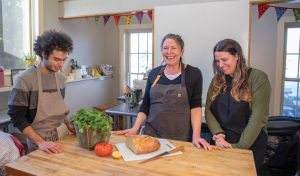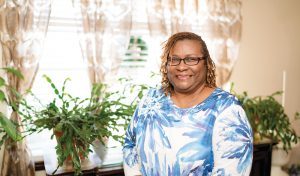by James DuMont
New Orleans
Ironically, I may owe some of my early success in New York to my father; resenting him gave my acting an edge that some directors found intriguing. More ironic still, our similarities—profound arrogance and a sense of entitlement—were the very ones that most often detonated my best opportunities.
In my mind, the show didn’t start until James DuMont arrived, sometimes with a slice of street pizza in hand, having caved to a hankering on the way to rehearsal. Upon arrival, I was usually enraged by the doorman.
“Door’s closed. Rehearsal starts at 4.”
“Four?” I’d bluster, checking my beeper. “Well, look, it’s 4 right now!”
“Starts at 4,” he’d say. “Which is to say rehearsal’s begun. Door’s closed.”
“Absurd!” I’d rage.
This was summer 1985. At 20, I was two years out from my mother’s house and dealing with the news of my father’s death. I was 5 and my twin sisters 3 when my mother filed for divorce; one too many women had called our home asking after him.
In both life and death he’d failed me, leaving me fuming but without anyone to direct my fury against. My mind was like a spinning lotto cage, my thoughts so many numbered balls bouncing madly about, hardly intelligible.
No one but my cousin could have gotten me to try something like Buddhism. He visited me in New York, in 1988, on a mission to introduce me to the practice. Basically, he bet our relationship on it working for me.
As I chanted, my anger cooled, and my thoughts, like lotto balls lining up in their chute, came to rest, into focus. At some point, a senior in faith encouraged me to chant for my father, an idea I found absurd. But chanting, my head cooled, and he came into focus as but one man in a long line of men, each simply playing the role that had been taught to him. My father, his father and his father before him—all of them had caved at a crucial moment in the lives of their families, chasing after something or somebody new, in search of happiness. Was this my fate, too? For the first time, I felt a profound and unsettling compassion for my father.
In the months that followed, I leaned into my Buddhist practice, doing what the great James DuMont could have hardly imagined himself doing before—supporting meetings behind the scenes, out of the spotlight. I gained an appreciation for everything that goes into putting something together—be it a meeting or a play—for the unseen efforts of countless people, be they script writers, directors, other actors—even doormen.
Within a year of my practice, my career took off. Within two, I’d met my future wife. Four years out, in 1992, I moved with her to Los Angeles to kick off a national tour of a Broadway show.
I put down roots in LA, took on SGI leadership and purchased a home with my wife. In 2001, we welcomed our first child, Sinclair, and in 2003, our second, Kelton. By 2008, I’d built up a solid résumé and a connection of mine offered me some work in Louisiana. I took it. “Just a few weeks’ work,” I told my wife. I was gone for the next 18 months.
In Louisiana, one job opportunity opened onto the next and opened in me a seemingly bottomless hunger—for recognition, for success. You’ve wanted this, fought for this, earned this! I told myself. Bouncing all over, I let my faith slacken.
My wife, who was singlehandedly raising the kids, underwriting my acting ambitions and working full time as a lawyer and partner at her firm, was stunned by my selfishness.
“You knew you were marrying an actor!” I accused, defensive, all bluster.
“Yes, but aren’t you a father, too?”
Self-righteous, fuming, I boarded a flight for another shoot, chanting some distracted daimoku under my breath.
Wherever I went, I brought a copy of Nichiren’s writings, though lately, I hadn’t given it the attention it deserved. On that flight, I lay it out on my lap, and the pages fell open to “On Offerings for Deceased Ancestors.” One passage stuck out, about the inheritance of karma across generations.
I’m slipping into the groove of my father’s karma, I realized. Here I was, with all this fortune from my Buddhist practice but still unsatisfied, arrogant, hungry, entitled. This is the work I have to do, I realized. I have to choose to play the role that none of the men in my family were taught to play—that of a father. This is something I can do, because I’ve had the great fortune to encounter Buddhism and a mentor in life in Ikeda Sensei.
Sensei says, “A mentor helps you perceive your own weaknesses and confront them with courage” (www.daisakuikeda.org).
I began to take my responsibilities seriously—as a district leader, husband and father. No matter where I traveled, I communicated with my family and my friends in faith. I kept the promises I made to myself, consistently hitting my daimoku goals and stopping into SGI centers wherever I’d landed. I planted seeds of Buddhahood on planes, trains and Uber rides.
As seems to be the case when I put faith first, my career again took off. When, in 2015, I was offered 12 weeks of work for Deepwater Horizon, a major feature film, I sat down with my wife to discuss. We were a team, her and I, and I wasn’t about to run off again, chasing some glittering idea of success. We decided that I should go for it and that we should make a gradual move to Louisiana, where with the lower cost of living she began, for the first time, working part time.
I did not have a father to mentor me in the ways of living, of fathering, of taking everything on without giving anything up. But what I did, and do, have is a mentor in life who taught me how to break the mold of the character I’d been instructed to play and live boldly, instead, as a great father for my children and partner for my wife, rewriting the script for generations to come.
“The greatest evil … produces consequences that not only affect the perpetrators personally but extend to their sons, their grandsons, and so on down to the seventh generation. And the same is true of the greatest good.”
“On Offerings for Deceased Ancestors,” The Writings of Nichiren Daishonin, vol. 1, p. 820)
You are reading {{ meterCount }} of {{ meterMax }} free premium articles

